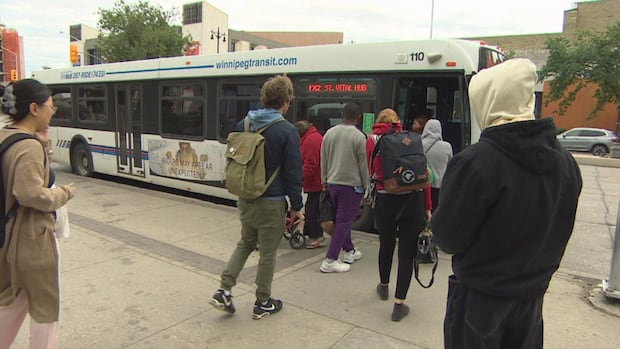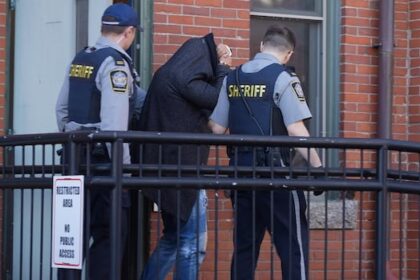ManitobaWinnipeg’s mayor hopes a crackdown down on people trying to ride the bus for free leads to more money and fewer safety concerns for the city’s transit system.Winnipeg Transit estimates it loses $7M to $10M annually to fare evasionCameron MacLean · CBC News · Posted: Sep 05, 2025 7:09 PM EDT | Last Updated: 6 hours agoWinnipeg Transit passengers could be asked whether they have the fare before they board a bus as part of an effort to crack down on fare evasion. (Ron Dhaliwal/CBC)Winnipeg’s mayor hopes a crackdown down on people trying to ride the bus for free leads to more money and fewer safety concerns for the city’s transit system.Community safety officers have begun patrolling bus stops, reminding passengers before they board that they have to pay.Mayor Scott Gillingham says for too many people, not paying for the bus has become a habit.”Too many times, when we look at the people who have been causing problems on the bus — assaults and disturbances — they’re individuals who have not paid,” Gillingham told reporters at city hall on Friday.According to statistics from the Amalgamated Transit Union Local 1505, there were 220 reported security incidents on buses in 2024, down slightly from a high of 257 the year before. So far in 2025, there have been a total of 189 incidents.In all of those years, roughly nine out of 10 incidents involved someone who had not paid. Transit estimates fare evasion costs the service $7 million to $10 million dollars a year.”I’ve had the public asking me, ‘I paid to get on the bus and taxpayers are paying to subsidize the transit operations. It should be that everyone else that can pay should be paying as well,'” Gillingham said.The City of Winnipeg launched the community safety teams last year, with a focus on making transit safer. Unlike transit supervisors, community safety officers have the legal authority to detain people, and carry non-lethal weapons such as pepper spray. The team, which began with 21 officers and two supervisors, has grown to more than 30 members. Although violence on buses often stems from disputes over fare payment, Gillingham doesn’t expect many people to try to force their way onto buses after the officers tell them they need to pay.”I don’t expect that a lot. I expect, frankly, when someone’s just asked, ‘Do you have fare?’ And they look like they’re individuals who can and should pay, and they say ‘no,’ I expect them to walk away,” Gillingham said.Fare evasion ‘allowed to fester’Logan Brunette, waiting for a bus on Main Street outside city hall on Friday, says the issue of fare evasion is complicated, but stricter enforcement is needed.”Generally, the people who aren’t paying to be on the bus are, I would say, more likely to cause a disturbance,” he said.”I had an experience this week where I was kicked by someone on the bus. I don’t know if they had paid or not, but it would also help to have a security presence on the bus.”Patrick Wright, waiting at the same bus stop, says he regularly sees people getting on without paying.”I see people just going in every time — five, six people at each bus stop. They’re not paying, obviously. There’s definitely a problem there,” he said.The union representing transit drivers has long called for greater fare enforcement. And while they support the mayor’s plan, they say the problem of fare evasion will take time to solve.Union president Chris Scott says drivers have borne the brunt of conflicts with passengers, and he welcomes any effort to curb fare evasion.”This is a behaviour that’s been allowed to fester and develop for many years, and it will take that long to retrain the riding public, or at least those that consistently evade. Fair that this is the new norm. Now you have to pay the fare.Gillingham says community safety officers will still have discretion in certain situations to allow people on buses without paying.Winnipeg mayor wants crackdown on transit fare evasionCommunity safety officers have begun patrolling bus stops, asking people whether they have fare before they board in an effort to deter people trying to evade paying. ABOUT THE AUTHORCameron MacLean is a journalist for CBC Manitoba living in Winnipeg, where he was born and raised. He has more than a decade of experience reporting in the city and across Manitoba, covering a wide range of topics, including courts, politics, housing, arts, health and breaking news. Email story tips to cameron.maclean@cbc.ca.
Friday, 6 Feb 2026
Canada – The Illusion
Search
Have an existing account?
Sign In
© 2022 Foxiz News Network. Ruby Design Company. All Rights Reserved.
You May also Like
- More News:
- history
- Standing Bear Network
- John Gonzalez
- ᐊᔭᐦᑊ ayahp — It happened
- Creation
- Beneath the Water
- Olympic gold medal
- Jim Thorpe
- type O blood
- the bringer of life
- Raven
- Wás’agi
- NoiseCat
- 'Sugarcane'
- The rivers still sing
- ᑲᓂᐸᐏᐟ ᒪᐢᑿ
- ᐅᑳᐤ okâw — We remember
- ᐊᓂᓈᐯᐃᐧᐣ aninâpêwin — Truth
- This is what it means to be human.
- Nokoma











